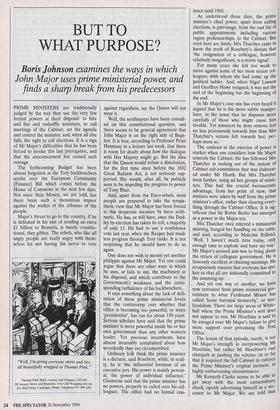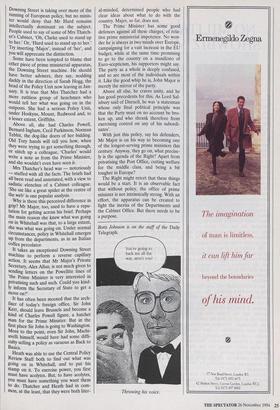BUT TO WHAT PURPOSE?
Boris Johnson examines the ways in which
John Major uses prime ministerial power, and finds a sharp break from his predecessors
PRIME MINISTERS are traditionally judged by the way they use the very few formal powers at their disposal: to hire and fire and reshuffle ministers, to call meetings of the Cabinet, set the agenda and control the minutes; and, when all else fails, the right to call elections. It is a sign of Mr Major's difficulties that he has been forced to invoke this last prerogative, and that the announcement has caused such outrage.
The forthcoming Budget has been almost forgotten as the Tory backbenchers seethe over the European Community (Finance) Bill which comes before the House of Commons in the next few days. Not since Ship Money, we are told, has there been such a monstrous impost against the wishes of the tribunes of the people.
Major's threat to go to the country, if he is defeated in his aim of sending an extra £1 billion to Brussels, is barely constitu- tional, they gibber. The rebels, who like all angry people are really angry with them- selves for not having the nerve to vote against regardless, say the Queen will not wear it.
Well, the soothsayers have been consult- ed on this constitutional question, and there seems to be general agreement that John Major is on the right side of Bage- hot. It is true, according to Professor Peter Hennessy in a lecture last week, that there is room for doubt about how the dialogue with Her Majesty might go. But the idea that the Queen would refuse a dissolution, for the first time since before the 1832 Great Reform Act, is not seriously sup- ported. She would, after all, be publicly seen to be impeding the progress to power of Tony Blair.
And, apart from the Euro-rebels, most people are prepared to take the sympa- thetic view that Mr Major has been forced to this desperate measure by mere arith- metic. He has, or will have, once the Dud- ley by-election has taken its toll, a majority of only 13. He had to use a confidence vote last year, when the Reaper had made less progress through Tory ranks. It is not surprising that he should have to do so again.
One does not wish to mount yet another philippic against Mr Major. Yet one could argue that there are other ways in which he uses, or fails to use, the machinery at his disposal; and which contribute to the Government's weakness and the corre- sponding turbulence of his backbenchers.
It says something about the lack of defi- nition of these prime ministerial levers that the controversy over whether that office is becoming too powerful, or more `presidential', has run for about 150 years. Serious scholars have said that the prime minister is more powerful inside his or her own government than any other western leader. Yet previous incumbents have almost invariably complained about how wretchedly they are circumscribed.
Ordinary folk think the prime minister is a dictator, said Rosebery, while, in reali- ty, he is 'the influential foreman of an executive jury. His power is mainly person- al, the power of individual influence.' Gladstone said that the prime minister has no powers, properly so called over his col- leagues. The office had no formal exis- tence until 1905.
As understood these days, the prime minister's chief power, apart from calling elections, is patronage, from the vast list of public appointments including various regius professorships, to the Cabinet. But even here are limits. Mrs Thatcher came to know the truth of Rosebery's dictum that `the resignation of a colleague, however relatively insignificant, is a storm signal'.
For many years she felt too weak to move against some of her most senior col- leagues, with whom she had come up the political ladder. And, when Nigel Lawson and Geoffrey Howe resigned, it was not the end of the beginning but the beginning of the end.
In Mr Major's case one has even heard it argued that he is the more subtle manipu- lator, in the sense that he disposes more carefully of those who might cause him trouble. Yet ministers he does remove feel no less poisonously towards him than Mrs Thatcher's victims felt towards her; per- haps more so.
The contrast in the exercise of power is starker when one considers how Mr Major controls the Cabinet. He has followed Mrs Thatcher in making use of the system of Cabinet sub-committees that was elaborat- ed under Mr Heath. But Mrs Thatcher went further, using ad hoc groups of minis- ters. This had the crucial bureaucratic advantage, from her point of view, that minutes were taken by staff from the prime minister's office, rather than clearing every- thing through the Cabinet Office. It is sig- nificant that Sir Robin Butler has emerged as a power in the Major era. Mrs Thatcher once entered a ministerial meeting, banged her handbag on the table, and said, according to Malcolm Rifkind, `Well, I haven't much time today, only enough time to explode and have my way. Mr Major's avowed aim was to bring about the return of collegiate government. He is famously excellent at chairing meetings. He scrupulously ensures that everyone has spo- ken so that all are notionally committed to the summing-up.
And yet one way or another, we have now retreated from prime ministerial gov- ernment to what Ferdinand Mount has called 'loose baronial monarchy', or nen- feudalism. There are large areas of White- hall where the Prime Minister's writ does not appear to run. Mr Heseltine is said to be enraged over Mr Major's failure to give more support over privatising the Post Office.
The lesson of that episode, surely, is not Mr Major's strength in overpowering Mr Heseltine, but rather Mr Heseltine's vast chutzpah in pushing the scheme on so far that it required the full Cabinet to enforce the Prime Minister's original instincts, in highly embarrassing circumstances.
Mr Kenneth Clarke seems to be able to get away with the most extraordinary cheek, openly advertising himself as a suc- cessor to Mr Major. We are told that Downing Street is taking over more of the running of European policy, but no minis- ter would deny that Mr Hurd remains Intellectually dominant on the subject. People used to say of some of Mrs Thatch- er's Cabinet, 'Oh, Clarke used to stand up to her.' Or, 'Hurd used to stand up to her.' Try inserting 'Major', instead of 'her', and you will appreciate the distinction. Some have been tempted to blame that other piece of prime ministerial apparatus, the Downing Street machine. He should have better advisers, they say, nodding darkly in the direction of Sarah Hogg, the head of the Policy Unit now leaving in Jan- uary. It is true that Mrs Thatcher had a more ruthless group of henchmen who would tell her what was going on in the outposts. She had a serious Policy Unit, under Hoskyns, Mount, Redwood and, to a lesser extent, Griffiths.
Above all, she had Charles Powell, Bernard Ingham, Cecil Parkinson, Norman Tebbit, the dog-like doers of her bidding. Old Tory hands will tell you how, when they were trying to get something through, or stitch up a colleague, 'Charles' would write a note as from the Prime Minister, and she wouldn't even have seen it.
Mrs Thatcher's head was — notoriously — stuffed with all the facts. The briefs had all been read and annotated, with a view to sadistic elenchus of a Cabinet colleague. She sat like a great spider at the centre of the web' is one popular analysis. Why is there this perceived difference in grip? Mr Major, too, used to have a repu- tation for getting across his brief. Perhaps the main reason she knew what was going on in Whitehall was that, to a large extent, she was what was going on. Under normal Circumstances, policy in Whitehall emerges 131) from the departments, as in an Italian coffee percolator. It takes an exceptional Downing Street machine to perform a reverse capillary action. It seems that Mr Major's Private Secretary, Alex Allan, is not much given to sending letters on the Powellite lines of `the Prime Minister is very interested in Privatising such and such. Could you kind- ly inform the Secretary of State to get a move on?'
It has often been mooted that the arch- fixer of today's foreign office, Sir John Kerr, should leave Brussels and become a kind of Charles Powell figure, a hatchet man for the Prime Minister. But in the first place Sir John is going to Washington. More to the point, even Sir John, Machi- avelli himself, would have had some diffi- culty selling a policy as vacuous as Back to Basics.
Heath was able to use the Central Policy Review Staff both to find out what was going on in Whitehall, and to put his stamp on it. To exercise power, you first must have acolytes. But, to have acolytes, you must have something you want them to do. Thatcher and Heath had in com- mon, at the least, that they were both liter- al-minded, determined people who had clear ideas about what to do with the country. Major, so far, does not.
The Prime Minister has some good defences against all these charges, of rela- tive prime ministerial impotence. No won- der he is always in two minds over Europe, campaigning for a vast increase in the EU budget, while at the same time promising to go to the country on a manifesto of Euro-scepticism, his supporters might say. The party as a whole is deeply confused, and so are most of the individuals within it. Like the good whip he is, John Major is merely the mirror of the party.
Above all else, he craves unity, and he has good precedents for this. As Lord Sal- isbury said of Disraeli, he was 'a statesman whose only final political principle was that the Party must on no account be bro- ken up, and who shrank therefore from exercising control on any of his subordi- nates'.
With just this policy, say his defenders, Mr Major is on his way to becoming one of the longest-serving prime ministers this century. Anyway, they go on, what precise- ly is the agenda of the Right? Apart from privatising the Post Office, cutting welfare for the middle . class, and being a bit tougher in Europe?
The Right might retort that these things would be a start. It is an observable fact that without policy, the office of prime minister is not intrinsically strong. With an effort, the apparatus can be created to fight the inertia of the Departments and the Cabinet Office. But there needs to be a purpose.
Boris Johnson is on the staff of the Daily Telegraph.
Throwing his voice.











































































 Previous page
Previous page